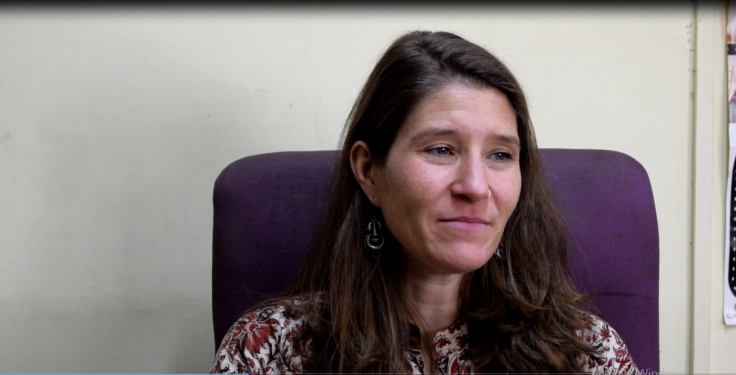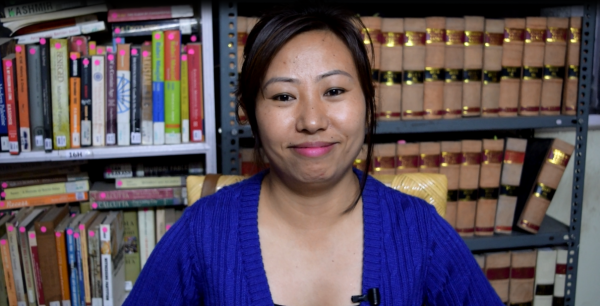The following is a report of a joint press release by African students and students from the north east against racial violence. There are two ways in which this can be seen. First is to see it as a strategy to build solidarity. The evident commonality between both groups being the racial nature of attacks against them. In these attacks, the ‘racial’ nature of it is questioned and is dismissed as a stray incident. Continue reading “African Students Unite With People from Northeast India to Protest Racism”
From the Archives: Photo Essays
(Darshana Mitra, Lawyer, Alternative Law Forum).
There have been many cases, case of violence, people being beaten up on the basis of their racial identity but the first question that the police asks is always, how did you know that it was on the basis of racial identity? How do you know it is race, why would you pin this down to race?
There have been cases of violence, like physical, sexual and labor rights violations, and also there are certain kind of violations which do not have immediate recourse in the law. For instance, when a private college student is discriminated on identity (place, race, language) and the college has no committee, we don’t have anti discriminatory committees like sexual harassment committees. Where this student should go to? These are the areas of traumatized experiences of violence but the law does not recognize the specific racial nature of the discrimination.

(Vinay, ALF).
Are there any specific reasons for Bangalore being the migrant city?
Historically Bangalore had mixed population. It is not a base of any particular group and when Kempegowda set it up he invited people to come here and start trade and which is how all the various Petes started, you know Balepete, Akkipete, Mamulpete, Dharjipete like Darjipete has tailors who were of Maratha origin. So Bangalore is a city of migrants and also when the British set up their base over here they got a lot of people from Tamilnadu, all the Mudaliars came to do the work and there were a lot of working class people who came to do the hard labor.
So I think, the city being more multicultural helped more migration along with the market expansion.

(Christopher, Sun Bird Foundation).
As much as you talk about diversity, I think most of us might not know what diversity actually is, my three and half years in Manipur, spoke a lot on this, there are 33 recognized major tribes and whole lot of minor tribes plus the majority community of Meitei. In Nagaland, there are 16 groups of Nagas, who have different facial features and languages and cannot communicate other than their language. So my point is, do we have any system to help those who people who migrate to cities and get into troubles without a communication medium?

From the Archives: Photo Essays
(Ms. Margaret Hoidina, hair stylist at Natural Beauty Salon who faced back wage payment issue in the city).
I was disappointed with the local people, because they have a lot of questions for us… Why are you wearing this? Why are you eating in this way? You are in that way, you are in this way? Why are you coming home late? So many questions! So that was very disappointing for me. As we have working hours till 8pm and sometimes till 10pm, and they think badly about our work and us.
People look at us as differently. We are same actually, the way of living style is a bit different, dressing style may be different but we are the same and I have questions for myself why I am in Bangalore and I felt like going back to my home.
When inquired about one thing that she wants to change in the city, Margaret wants everyone to be treated equally.

(Andrea Wright, Anthropologist at Brown University, USA. Her research broadly focuses on how women’s bodies and beauty are used as representations of modernity and development in India. She works closely with women from the North East who work in beauty salons in Bangalore. )
What do you think of the term North East? As we use it so casually!
Andrea: I think the term North East is problematic. As a geographical term it makes sense, right? like this is the north east of India. But as a term that encompasses culture, society, language, I mean, it is very problematic, you can’t just pretend that all these people from this region of India have anything in common.
I think calling someone northeastern does disservice to the diversity of cultures, languages, religions, and politics across the region.

(Rini Ralte is the coordinator of North East Solidarty, an association of people from North Eastern states residing in Bengaluru. She is a professor and chairperson of the Women’s Studies Department in the United Theological College, Bangalore).
We are talking about the gap that built among the communities. We came to realize more and more, even if you look at the text books there is no knowledge about the north east. As there is no information, there will be lack of awareness of these people and also there wouldn’t any interest among others to know. So as a nation this has to be addressed. For example in the north east region, at school level we study the geography and history of other regions of the country but it is not the other way around. Of course it is not possible to maintain same kind of textbooks across states but in terms of cross cultural learning is lacking.
Your thoughts on Racism?
The word racism is not used and accepted vividly by governments at large. But what else can I use other than racism if certain community is attacked? Seeing their vulnerability either in language or culture or any other means. So therefore anything related to targeted issue is called racism for me.

From the Archives
Anticipatory bail: a direction to release a person on bail, issued even before the person is arrested.
SC gives slew of directions with regards to racial violence against people from north-east
Supreme Court was of the view that involvement of the law enforcement machinery is alone not sufficient to resolve the problem and stressed that mindsets have to be changed.
Read more : Supreme court on racial violence: Indian Express
In Goa’s spas, Northeastern women work under fear of sexual assault, salary cuts
Article: Scroll.in #womenunsafe
Northeastern women employed in Goa’s spas and salons have come out in protest against unfair labour practices and an unsafe work environment that puts them at risk of sexual assault and compromises their dignity.
The matter came to the fore when a dozen women therapists at a leading salon and spa in North Goa quit en masse on August 20 and, five days later, approached the North East Association of Goa – which represents the Northeastern community in the state and especially the 3,000-odd migrant workers from the region – for help. Continue reading “In Goa’s spas, Northeastern women work under fear of sexual assault, salary cuts”
Gungte : A poem on the recent attack on a student in Bangalore
GUNGTE
Sometimes I wonder
Walking down the metropolitan street.
North-easterners and mainland Indians,
Why do our wavelengths never meet?
Why does my face induce so much allergy
in your mind?
Why am I treated
Like a filthy swine?
And looked down upon
As a lesser kind? Continue reading “Gungte : A poem on the recent attack on a student in Bangalore”
Poetry from the North East
We left you to never return again
We live now in hatred in dry cities
With a hope to come back to you someday.
Every now and then when we look
At you, there is nothing that there was.
There is no longer anything that is you.
Where do we go then
When we are tired?
Where do we then return?
– Goirick Brahmachari, For the Love of Pork
Goirick Brahmachari is a poet based in Delhi. He hails from Silchar, in Assam.
If images could be set to music, Goirick’s poetry that touches on landscapes of Silchar, the urban spaces of Delhi, of ‘home and homelessness’ would have made a great soundtrack for our film.
Some of Goirick’s poetry can be found here:
http://raiot.in/two-poems-goirick-brahmachari/
http://raiot.in/our-time-is-here-2-poems/
http://raiot.in/reimagining-movies-4-poems/
A review of his collection of poems “For the love of Pork”:
Interview with Andrea Wright
In this snippet from her interview, Andrea Wright, an anthropologist currently with Brown University talks about the ‘exodus’ of people from the North East from Bengaluru in 2012, and how it has affected the relationship of the community with the city and vice-versa.




